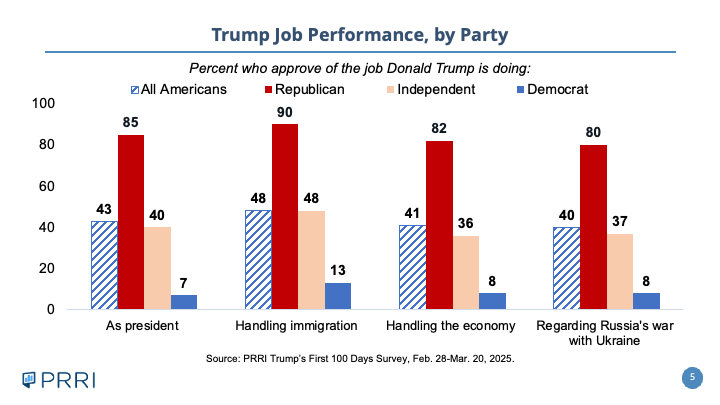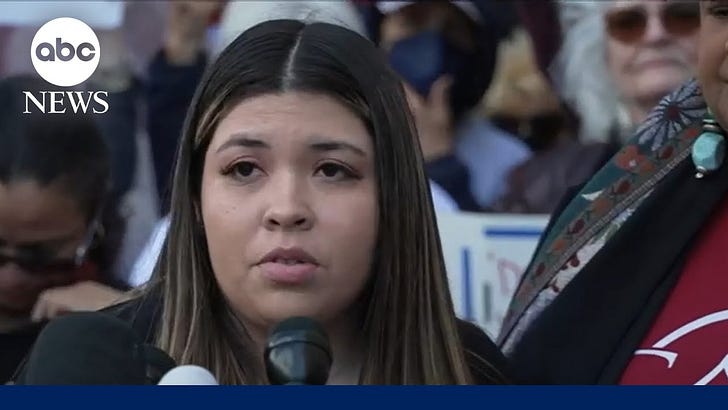New PRRI Poll: Most Americans Believe Trump is Dangerous Dictator--and Six Other Key Findings on Trump's 100 Days
There are signs that the public is waking up to the dangers Trump presents for democracy--a summary of Trump's first 100 days in 5 charts.
The
team is out today with a major new poll evaluating public opinion of Trump over the first 100 days of his term. Here’s the bottom line: This new survey provides clear evidence that most Americans want to rein in President Trump’s overreach, stop his undermining of democratic norms, and protect our system of checks and balances.You can check out the full report here on PRRI’s website, but here’s a highlight reel of the key findings in five charts.
1. A Majority of Americans Agree That President Trump Is “A Dangerous Dictator Whose Power Should Be Limited”
In the new survey, a majority of Americans (52%), including 56% of independents, believe that “President Trump is a dangerous dictator whose power should be limited before he destroys American democracy,” compared with 44% who believe that “President Trump is a strong leader who should be given the power he needs to restore America’s greatness.”
As PRRI has consistently found in other surveys, there is a stunning ethno-religious divide in support for Trump. Most white Christians say Trump is a strong leader who should be given power he needs to restore American greatness. But most in other religious groups—non-white Christians, Jews, other non-Christian religions, and the unaffiliated—believe Trump is a dangerous dictator whose power should be limited before he destroys American democracy.
2. Trump is underwater, and sinking, on job approval and personal favorability.
A majority (54%) of Americans disapprove of the job Trump is doing as president, with just 43% approving (although 85% of Republicans approve).
Among religious groups, Trump enjoys majority job approval only among white Christian groups and supporters of Christian nationalism. No more than 35% of any other religious group—including only 18% of Black Protestants—approve of the job Trump is doing as president.
Compared to a comparable period in Trump’s first term, his personal favorability among independents is down seven points, from 42% in 2017 to 35% today. In the religious landscape, Trump’s favorability ratings remain largely stable among most groups since the 2024 election, with two notable exceptions: Hispanic Protestants and Hispanic Catholics. Most notable are Hispanic Protestants, who voted 64% for Trump in 2024. Trump’s favorability among Hispanic Protestants is now down nearly 20 points since the election, from 51% to only 32%.
3. Few Americans, and only three in ten Republicans, believe the president should be able to ignore Congress or the Supreme Court.
Nearly eight in ten Americans (78%) disagree with the statement, “When decisions by Congress or the Supreme Court hold our country back, the president should be able to ignore them,” compared with only about one in five (18%) who agree; Republicans are more than three times as likely as Democrats to agree (28% vs. 9%). Similarly, only one in five (20%) Americans, but 29% of Republicans, agree we need a president who is willing to break some laws if that’s what it takes to set things right.
4. Eight in ten Americans oppose the establishment of Trump’s so-called “Anti-Christian Bias Task Force.”
The survey finds widespread opposition to Trump’s key executive orders, including mass firing of federal employees, tariffs, and ending birthright citizenship.
There is also strong and widespread opposition to Trump’s so-called “Anti-Christian Bias Task Force.” Nearly eight in ten Americans (78%) oppose “the establishment of a federal task force that focuses exclusively on discrimination against Christians rather than discrimination against all religions,” while only 16% favor it. Majorities of Democrats (91%), independents (85%), and Republicans (66%) oppose such a task force, as do majorities of all major religious groups, including even white evangelical Protestants (66%).
5. Few Americans believe the racist so-called “Great Replacement Theory” or support Trump’s plans to establish militarized internment camps to facilitate mass deportations of undocumented immigrants.
Only one third of Americans (33%) agree with the statement, “Immigrants are invading our country and replacing our cultural and ethnic background,” the sentiment at the core of the racist so-called “Great Replacement Theory” that Trump has repeatedly touted in speeches. Republicans (60%) are more than twice as likely as independents (30%) and Democrats (12%) to agree with this sentiment.
Only about one third (35%) of Americans agree that the federal government should place immigrants who are in the country illegally in internment camps guarded by the U.S. military until they can be deported. Republicans (62%) are also roughly twice as likely as independents (31%) or Democrats (15%) to agree with this policy.
Perhaps the most disturbing finding in the religious landscape is this one: A majority of white evangelical Protestants believe both that immigrants are invading the country and replacing real Americans (57%) and that the government should place immigrants into militarized internment camps until they can be deported (56%). There are no other major religious groups in which majorities hold either of these views.
6. Most Americans do not believe there is serious discrimination against Christians or white Americans, but Republicans and white evangelicals do.
Less than four in ten Americans believe that discrimination against Christians (36%) or white Americans (37%) has become as big a problem as discrimination against other groups. However, roughly six in ten Republicans (58% Christians, 60% white Americans) and white evangelical Protestants (66% Christians, 59% white Americans) agree. No other religious groups have majorities who agree with either sentiment.
7. So much for “improper ideology”: There is broad support for a critical approach to teaching American history.
The vast majority of Americans (86%) agree that “we should teach American history that includes both our best achievements and our worst mistakes,” compared to only 10% who agree that “we should teach American history that only focuses on what makes this country exceptional and great.” Support for a critical approach to teaching American history includes 69% of Republicans and 88% of white evangelical Protestants.
There’s so much more in the full survey report on the PRRI website. I hope you’ll check it out there.
ICYMI on #WhiteTooLong
Between History and Hope: Remarks on the 128th Anniversary of the Lynching of Joseph McCoy in Alexandria, Virginia
Wednesday night I had the honor of being the speaker for the annual event commemorating the lynching of Joseph McCoy on April 23, 1897, hosted by the Alexandria Community Remembrance Project (ACRP). I’ve included below my remarks, titled “Between History and Hope,” which are adapted from a chapter in my book,
"God Hasn't Forgotten about You": An Easter Message from Jennifer, the Wife of Kilmar Abrego Garcia
My heart, like many of yours, is heavy, weighed down by the unrelenting attacks on the foundations of a pluralistic democracy and American values coming out of the Donald Trump administration. The weight has felt even heavier during this time between Passover and Easter, both of which my interfaith family celebrate.













